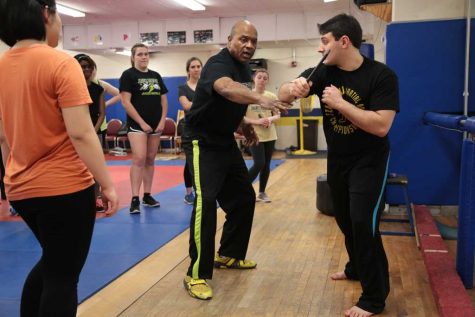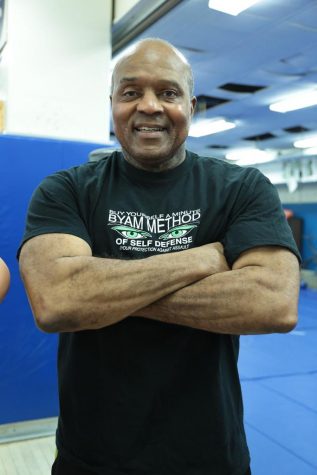An arsenal of weapons lies across six tables in Curtis Smith’s self-defense class — not that you’d know it if you looked.
At first glance, a cell phone, some pens and other everyday items sit on the table, all seemingly harmless. But when Smith starts talking, everything comes together.
The cell phone is a taser. The pens: blades that bring a whole new meaning to their “fine point” classification.
“This crucifix has a blade within,” Smith said, picking up the Christian symbol and flicking out a knife. “Praise the lord.”
Around 4:15 p.m. every Wednesday, Smith, a Pitt police officer for 36 years and a self-defense instructor at Pitt, instructs his students on self-defense strikes, blocks and other maneuvers. At this week’s class, he called his students over to lecture on concealed weaponry.
Before he summoned them to the weapon-filled tables to inspect the dangerous facades, his students were grappling, learning how to reverse various holds. Curtis coached two students through a wrestle, one locking their leg around their partner’s neck and the other with their back squished into the mat on the floor.
“You’ve got to get your leg at a 90-degree angle behind that upper cervical region … behind that neck,” Curtis told two students entangled on the mat.
Smith, 62, has taught self-defense classes at Pitt for about 40 years. Just four years after he started his instructor career, he decided to join the force to help keep the city a safe place.
Students sign up for his one-credit martial arts classes such as self-defense, budo and kickboxing. Smith said he’d like to see self-defense classes become a general education requirement at Pitt because knowing how to protect oneself is a skill everyone should have.
“The number one killer event that will keep you in harm’s way? Denial,” Smith said. “[People say] ‘It can’t happen to me.’ But it can happen to you.”
Smith is right to warn his students to be wary. Behind alcohol violations, burglaries and sexual violence are the two most common crimes on Pitt’s campus, according the Fall 2015 Annual Security and Fire Safety Report. In 2014, the Pitt police reported 220 thefts and 63 total assaults. And according to the 2015 Association of American Universities Campus Climate survey, 21 percent of women and 6.2 percent of men at Pitt said they’ve experienced sexual violence on campus.

Smith, though, can’t teach Pitt’s student body to protect itself all on his own.
Kevin Sciullo, a 2015 Pitt graduate and Smith’s assistant and protege, demonstrated transitions on students in front of the class.
Sciullo, who also instructs Pitt’s East West Martial Arts Club, said he met Smith at a national martial arts tournament, and he quickly learned that Smith’s instruction style is one of the best he’s ever experienced because of his willingness to go beyond a stiff, disciplined master-student relationship.
“The way I teach is based on emulating [Smith],” Sciullo said. “A lot of instructors are really formal … [Smith] takes a hands-on approach. It’s almost a coach mindset … and he’s always open to expand his mind, even at this age.”
Smith said remaining humble and getting to know each student on a personal level are both essential to being a good teacher.
“Skillful practitioners [of martial arts] and skillful teachers are two different things,” Smith said. “Teaching is a different art form … If you’re a great leader, you’re also a great listener. You have to have an open and conscientious mind … You have to be good at reading people.”
For him, paying attention to each individual student makes for a more relaxed and effective learning environment.
Smith’s lifetime accomplishments in the field of martial arts are extensive. He is retired from competition today, but for decades he fought in tournaments every weekend. He has hundreds of awards to show for it.

Yet with all the time he’s dedicated to perfecting his skills, he’s still found time for love. Smith married his wife, who is a teacher, 37 years ago, and they have four children.
“Your wife [should be] your best friend,” Smith said. “You’ve got to be lucky to find the right person at the right time in your life.”
These days, as he spends more time with his family and less time competing, Smith stays in tune with his martial arts side by partnering with organizations like the Professional Karate Commission to host the annual Ultimate Force Martial Arts Tournament, where students and other martial artists compete in matches on Pitt’s campus.
Kerry McCans, a sophomore pre-med student and member of Smith’s Wednesday class, said she never took a formal self-defense class before she signed up at her friend’s recommendation.
She said Smith’s real-life experience as a Pitt police officer makes his self-defense class all the more engaging.
“[Smith] mixes seriousness with being entertaining and funny,” McCans said. “This class is awesome. I love it … You learn valuable skills and get some good stress relief.”
Though martial arts is a sport, its meaning runs far deeper for its avid practitioners than the physical aspect alone, according to Smith.
“When you really start to learn martial arts,” Smith said, “your training becomes infinite. There’s the physical stage, the metaphysical stage, the mental stage. You gain an understanding of time and distance. When you focus on an opponent, you’re looking to and through that opponent.”
As for what he does with his downtime — when he’s not teaching classes or on duty as a police officer — Smith laughs.
“I train.”

